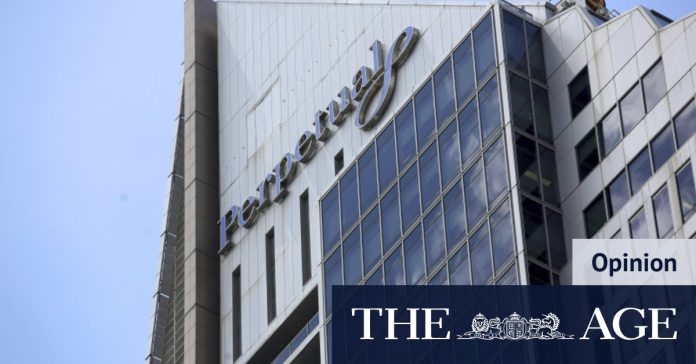[ad_1]
To answer this, it’s worth first looking at the tough backdrop facing stock pickers such as Perpetual, Magellan and Platinum.
These businesses are all “active” managers: they charge investors fees for attempting to beat the sharemarket’s average return. Funds management can be highly lucrative when it’s going well, but lately this business model has been steadily eroded by pressure from two giants of the investment world: global index funds and superannuation funds.
Loading
Index funds – also known as “passive” funds – charge a fraction of the fees of active managers to give you the average returns from a market index such as the ASX 200. Given how tough it is for fund managers to consistently beat the market, more and more people have decided to put their money in an index fund.
Super funds, meanwhile, are also throwing less business to external fund managers such as Perpetual. Under pressure to cut their fees, more and more super funds have become so large that it makes more sense for them to employ their own fund managers, rather than pay external managers.
The bottom line: many active managers have suffered outflows, and profit margins are being squeezed.
Perpetual’s response to this unhappy situation was to get more “scale”, by bulking up its funds under management. It bought environmental, social governance stock picker Trillium in 2020, then it snapped up a larger US fund manager called Barrow Hanley, and finally, it merged with its big local rival, Pendal (formerly known as BT Investment Management).
In picking over Perpetual’s poor share price performance in recent years, analysts and investors agree that it probably needed to gain scale, but they say it had mixed success with these deals. Buying Trillium was a success, but many believe Perpetual overpaid for Pendal, a deal finalised in early 2023.
Critics at the time also highlighted the difficulties of merging fund managers, which can result in key money managers leaving, or in added complexity.
Since the Pendal deal was finalised early last year, Perpetual’s shares have fallen about 15 per cent. Private equity giant KKR now wants to buy Perpetual’s corporate trust business and a wealth management arm, leaving Perpetual shareholders owning a “pure play” fund manager with about $200 billion in funds under management.
Loading
How would a stand-alone and specialist fund manager deal with the industry-wide challenges of stiff competition from index funds and the growing clout of super funds?
Perpetual argues that it will have the scale and range of different investment styles it needs to grow “organically” (without buying other firms). Perhaps, but there’s little doubt it is a harder environment for stock-picking businesses, even ones managing $200 billion.
Morningstar analyst Shaun Ler says even after the proposed break-up of Perpetual, the company will still face the same long-term challenges to its business model.
Passive funds or quant funds using algorithms can often effectively match the average market-wide returns for a much lower fee than what is charged by active managers, including Perpetual. While some stock pickers beat the market, it’s very hard for them to do this consistently over the long term.
“There are active managers investing into global equities that charge more than 1.3 per cent of [funds under management], but there are passive options that can do the same thing and charge around 0.2 per cent or less,” Ler says.
“There is still room for active managers, but I would say the consistently poorer performing ones are at risk of closure or being consolidated. The surviving ones need to rethink their business proposition, their fees and their cost base.”
The Business Briefing newsletter delivers major stories, exclusive coverage and expert opinion. Sign up to get it every weekday morning.
[ad_2]
Source link



